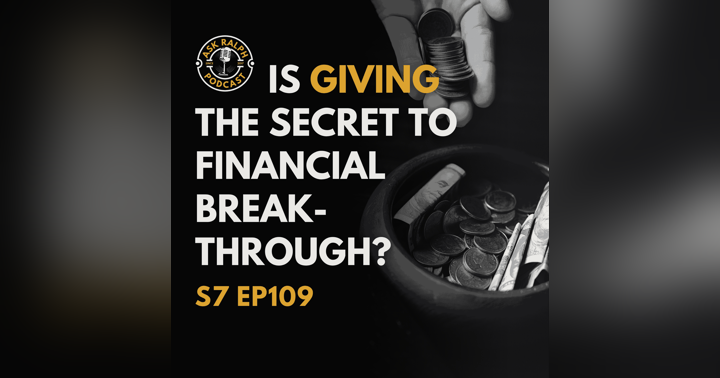Is It Possible to Combine Financial Discipline and Spiritual Growth?

How Can I Use Financial “Fasting” to Grow Closer to God?
Struggling with your finances and feeling distant from God can be incredibly challenging. The pressure of materialism and constant spending can make it seem impossible to find peace and spiritual growth. Join Ralph Estep Jr. as he introduces the concept of “Financial Fasting”, a powerful practice that combines financial discipline with spiritual development. Ralph explains how financial fasting, grounded in biblical principles, can help you break free from the chains of financial stress and grow closer to God. He shares personal experiences and practical tips on how to start your own financial fast, from setting a specific timeframe to redirecting your resources towards giving and saving. Whether you're looking to improve your financial situation or deepen your relationship with God, this episode is a must-listen for anyone seeking true freedom and Combine Financial Discipline and Spiritual Growth.
Watch Now on Rumble
Introduction
Ralph introduces the concept of financial fasting, explaining its potential to improve both finances and spiritual growth. He sets the stage for the discussion by briefly referencing the previous episode on handling IRS audits. Ralph expresses gratitude for the audience's support and frames financial fasting as a transformative practice that aligns financial habits with spiritual values.
Listener's Concern
A listener named Stephen from Huntsville, Alabama, asks Ralph about the connection between fasting, as mentioned in the Bible, and financial management. Stephen shares his struggles with finances and how they impact his relationship with God. Ralph appreciates the relevance of the question and sets out to provide an insightful answer. He acknowledges that many listeners might find themselves in a similar situation.
Bible Verse
Ralph reads from the book of Isaiah, highlighting a passage that emphasizes breaking the chains of injustice and setting the oppressed free. He interprets this passage as a broader definition of fasting, not limited to abstaining from food but extending to breaking free from financial struggles. Ralph underscores that financial burdens can feel like oppressive chains. This biblical perspective provides a foundation for understanding financial fasting. He relates it directly to the concept of overcoming financial challenges.
Defining Financial Fasting
Ralph defines financial fasting as intentionally cutting back on spending or giving up certain financial habits for a set period. He distinguishes it from budgeting by emphasizing its spiritual focus. Ralph shares that financial fasting involves redirecting attention from material possessions to spiritual growth. He introduces the concept as a step further than regular budgeting, aiming for a deeper impact on one's spiritual life.
Ralph's Personal Experience
Ralph shares his personal experience with a 30-day financial fast. He describes feeling overwhelmed by consumerism and deciding to cut non-essential spending. This personal story illustrates the challenges and rewards of financial fasting. Ralph mentions the initial difficulty of realizing how much his life revolved around spending money. As the fast progressed, he found more time for prayer, more resources for giving, and a greater appreciation for life's true values.
Actionable Steps
Ralph outlines practical steps for starting a financial fast. He advises setting a specific timeframe and being clear about what to give up. Redirecting resources saved from the fast towards giving or saving is a key component. Ralph also suggests using the time gained to pray, read the Bible, or serve others. Keeping a journal to document experiences and sharing the journey with friends or family for accountability is recommended.
Spiritual Benefits
Ralph explains how financial fasting can strengthen one's relationship with God. By reducing materialism, individuals can focus more on spiritual growth and rely on God for contentment. Financial fasting creates opportunities to trust God rather than material possessions. Ralph emphasizes the transformative power of this practice in deepening faith and spiritual understanding. He highlights the importance of intentional living and how it aligns financial decisions with spiritual values.
Community Impact
Ralph discusses the communal aspect of financial fasting, referencing Isaiah's call to set the oppressed free. He suggests that savings from the fast can support local charities or help those in need. Ralph envisions a collective effort where financial fasting leads to tangible improvements in communities. He encourages listeners to consider the broader impact of their fasting.
Addressing Concerns About Financial Fasting
Ralph acknowledges concerns from listeners who are already struggling financially. He reassures that financial fasting can be adapted to any budget. Suggestions include small sacrifices, like giving up a Netflix subscription or cooking at home. The focus is on intentionality rather than deprivation. Ralph emphasizes that financial fasting is about realigning priorities and can be practiced in various forms. He encourages listeners to find a version of the fast that fits their situation.
Mike's Story
Ralph shares the story of Mike, a man who struggled with credit card debt and felt disconnected from his faith. After trying a 21-day financial fast, Mike experienced a significant shift in his life. He saved money, paid down debt, and felt a renewed sense of purpose and connection with God. Ralph uses Mike's story to illustrate the potential life-changing impact of financial fasting.
Recap and Final Thoughts
Ralph recaps the key points of the episode, emphasizing the benefits of financial fasting. He reiterates that it's a practice rooted in biblical principles that fosters personal and spiritual growth. Ralph ends with a call to action, inviting listeners to try a financial fast and share their experiences. He reminds them of the interconnectedness of faith and finances, urging them to live intentionally.











